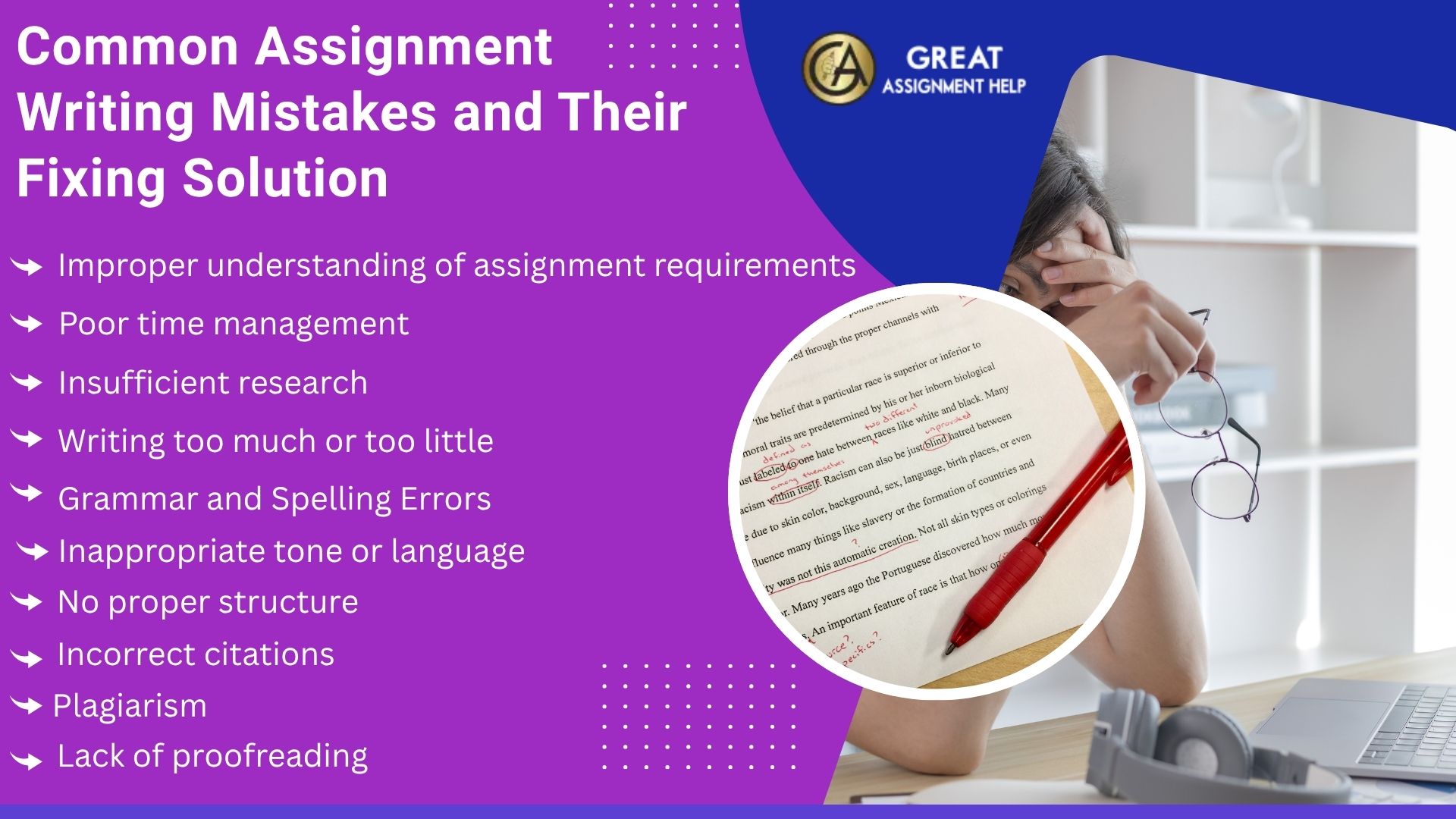This article has been reviewed and updated with current information, new examples, and the latest academic requirements for 2025
Some common mistakes students make when doing assignments are plagiarism, poor research, improper citations, and lack of proofreading. To avoid major assignment writing mistakes, you should clearly understand the requirements and craft well-structured content without plagiarism. Also, you should proofread your assignment before submission to fix the grammar, spelling, and citation errors.
When you write assignments, it is normal for you to make some mistakes. But some errors will affect your overall grades. So, you must make sure to submit high-quality and error-free assignments according to your professor’s instructions to achieve top grades. If you are unsure how to write a flawless assignment, then continue reading this blog. Here, we have analyzed and listed the 10 common mistakes that students often make when writing assignments. In addition to that, we have also shared some valuable tips on how to avoid those common assignment mistakes that students regularly commit. If you follow the tips we have suggested, you can improve your writing skills and also improve your assignment scores.
Common Assignment Writing Mistakes and Their Fixing Solution

If you are a student, then you might knowingly and unknowingly commit the following mistakes when writing your assignments. But in case you would love to excel in academics, then avoid the frequently committed assignment mistakes by sticking to the tips we have recommended.
1. Improper understanding of assignment requirements
When working on an assignment, you might make a common mistake by not fully understanding what is being asked. This can happen if you don’t read the instructions carefully or don’t grasp the assignment question or requirements. As a result, your response might not be what your professor is looking for.
To avoid this, take your time to read the instructions thoroughly. If you are unsure, don’t hesitate to ask your professor for clarification. If you are still unclear, go back and re-read the instructions until you understand exactly what your instructor wishes to see in your assignment.
2. Poor time management
When you delay writing your assignments until the last minute, you might get poor results. Moreover, it will make others think that you are not good at writing. This can give you some negative experiences, poor grades, and force you to believe that you will never be good at writing. To break this cycle, plan early, properly manage time, and set yourself up for success.
Whenever your instructor asks you to write an assignment, first, take your time to understand what’s required and break it down into manageable steps. This will help you produce your best work and achieve good grades. If you have a good plan, then your confidence in writing will increase, and you can also create a high-quality assignment worthy of an A+ grade.
3. Insufficient research
When you write an assignment or an academic paper, you should support your arguments with evidence. To do this, you should read widely on the topic and learn how to find and analyze reliable sources.
Many students struggle with research. But you can improve your research skills by reading extensively and practicing how to use sources to back up your claims. Especially when researching, make sure to use the right sources and take the time to fully understand the topic. This will help you write a stronger academic paper without errors and achieve better grades.
4. Writing too much or too little
If you write a lengthy or a short academic paper without following the word count or other requirements specified by your instructor, then your grades will be affected.
When writing an assignment, you need to stay within the word limit and focus on relevant information. Don’t write too much or too little. The answers to your assignment question should be concise and clear. In your assignment paper, never share unnecessary details. Make sure to include only information that directly answers the assignment question.
5. Grammar and Spelling Errors
If you make grammar mistakes or typos in your assignment paper, then your writing will look unprofessional. Also, such errors will affect the overall quality of your work. To avoid this, you should proofread your work carefully before submitting it.
Specifically, you can use tools like Grammarly to identify errors in your text. Also, you can find out the mistakes in your assignment easily by reading it out loud.
6. Inappropriate tone or language
You will get poor grades if you write your assignments using an improper tone or poor language. Moreover, it might become hard for your professors to understand your writing if you overuse complex vocabulary or fancy words.
To avoid this, when you write an assignment, make sure to use formal and academic language. In your assignment paper, never use everyday language, slang, and abbreviations. Instead, use standard and simple vocabulary that fits the tone of the academic writing. By doing so, you can make your work look more professional.
7. No proper structure
The assignment you prepare should be well-structured and well-researched. If the assignment is not structured as per your instructor’s guidelines, then you cannot achieve good grades.
So, when you write an assignment, make sure to follow a specific structure and neatly organize your ideas. The standard format of an assignment includes three major sections such as an introduction, body, and conclusion. In each part of your assignment, provide useful information clearly and concisely. Additionally, stick to the assignment requirements and guidelines of your instructor to meet their expectations.
8. Incorrect citations
When you create your academic papers, you need to use enough academic references and cite them correctly. If you don’t cite properly, then it might affect the credibility of your work.
To avoid this, learn how to use citations properly. Generally, through academic referencing, you can give credit to the authors whose work you have used and help your readers find the sources you have cited. Simply by citing references, you can acknowledge the work of others and add credibility to your work.
9. Plagiarism
Plagiarism is one major mistake a lot of students make when writing their academic papers. If you copy ideas or words and use them in your academic work without giving credit, then you will face serious penalties.
To avoid this, always cite your sources, even if you are paraphrasing. Also, when you quote someone directly, use quotation marks and cite the source. In case you want to use copyrighted material, first ask the copyright holder for permission. Most importantly, before submission, you can also use plagiarism-check tools to ensure your work is original.
10. Lack of proofreading
If you submit a first draft of your assignment without proofreading, then it might have mistakes or unclear ideas. Specifically, it might have errors in grammar, spelling, and facts.
To avoid this, take the time to read over your work multiple times. By revising your work, you can ensure it’s clear, consistent, and flows well. You can also ask someone else, like a peer or mentor, to review it and provide feedback.
Wrapping Up
Writing assignments can be challenging, and it is normal for everyone to make mistakes. However, you can learn from those mistakes and try to avoid them in the future. Especially, by following the assignment writing tips we have suggested in this blog, you can improve your writing skills and produce papers that are clear, concise, and error-free. This will help you do your best work and achieve your goals. If you still struggle to write a flawless assignment, then contact Great Assignment Help immediately. Our team contains well-educated and experienced academic writers on various subjects to offer high-quality Assignment Help Online. According to your requirements, the assignment experts on our platform will guide you in writing plagiarism-free, well-cited, and flawless assignments deserving of top grades.



